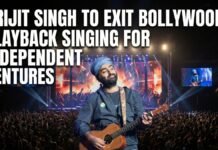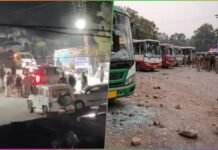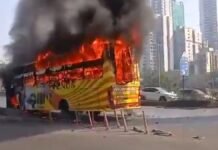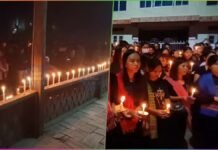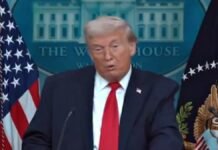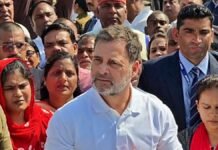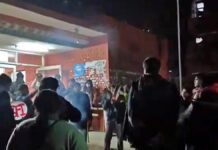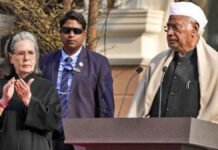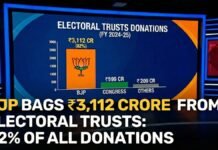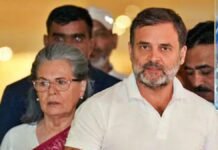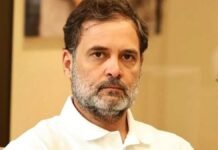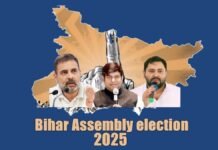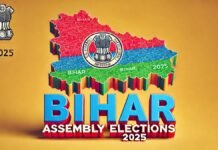
Key Point
- Rahul Gandhi detailed five alleged “vote theft” methods on August 7, followed by a march of nearly 300 INDIA bloc MPs toward the Election Commission; several leaders were briefly detained by Delhi Police amid heavy barricading and later released.
- Congress President Mallikarjun Kharge convened an emergency meeting of AICC general secretaries, state in-charges, and frontal heads to plan a nationwide campaign against alleged voter list rigging and electoral fraud, aligning opposition messaging ahead of state polls.
- NSUI and Youth Congress mobilised in Delhi with parallel marches against the Election Commission, echoing the “vote chori” charge and demanding rollback of Bihar’s Special Intensive Revision (SIR) of electoral rolls.
- Sonia Gandhi, Kharge, and INDIA bloc MPs staged a symbolic T‑shirt protest in Parliament “Minta Devi: 124 Not Out” highlighting alleged anomalies in Bihar’s rolls and pressing for an immediate debate and rollback of SIR.
- Rahul Gandhi reiterated the “one person, one vote” plank, accusing the ECI of failing its constitutional duty and refusing to file an oath beyond citing ECI’s own data, while the poll body asked him to submit a formal declaration or apologise.
New Delhi: At a press conference on August 7, Rahul Gandhi showcased what he called evidence of “vote theft,” outlining alleged duplication, fake addresses, misuse of forms, and irregular additions that, he said, subvert “one person, one vote,” a claim he tied directly to ECI data and demanded accountability through an immediate institutional response. The next escalation saw nearly 300 MPs from the INDIA bloc march from Parliament toward the Election Commission on August 11, where Delhi Police put up barricades, briefly detaining leaders including Rahul Gandhi and Mallikarjun Kharge before releasing them, underscoring the opposition’s demand for a formal audience with the poll panel. Gandhi later said he would not sign an oath because the numbers came from the ECI’s own systems, calling the standoff a constitutional fight and alleging the commission denied a large delegation a hearing, which the ECI countered by seeking a formal declaration or apology.
Kharge’s Emergency Huddle And Nationwide Plan
Amid the protests, Congress President Mallikarjun Kharge chaired an emergency meeting of AICC general secretaries, state in‑charges, and heads of frontal organisations to finalise a national campaign against alleged manipulation of voter rolls, syncing strategy with allied parties as SIR in Bihar becomes a flashpoint before elections. The outreach followed dinner diplomacy among INDIA bloc leaders to solidify a common line on SIR and “vote chori,” with participants from multiple parties signalling a united front and telegraphing that similar revision exercises could be challenged more broadly if patterns persist, framing the issue as a constitutional and democratic integrity question. Congress communications amplified the plan with digital mobilization, including a web portal to collect public inputs and spotlight alleged discrepancies in electoral rolls, designed to feed both legal and political follow-ups across states.
Street Protests And Campus Mobilisation
Student and youth arms NSUI and Youth Congress—organised marches in Delhi from their headquarters to Jantar Mantar and across central corridors, mirroring parliamentary protests and demanding an independent audit of the SIR process, with police restrictions prompting detentions and rapid releases typical of high-intensity demonstrations in the capital. Broadcast coverage showed lawmakers staging sit-ins at barricades and being transported to nearby police stations before release, as opposition leaders asserted that large delegations should be allowed to place their documents directly before the Commission without fragmentation, a demand the bloc linked to transparency and fairness. The INDIA bloc’s synchronised messaging, including slogans and placards “Our Vote. Our Right. Our Fight” and “SIR Silent Invisible Rigging” was calibrated to elevate voter disenfranchisement concerns to a national, not merely Bihar-focused, narrative ahead of upcoming state polls.
‘124 Not Out’ Symbolism Inside Parliament
Inside the Parliament complex, opposition MPs donned white T‑shirts featuring “Minta Devi” and “124 Not Out,” citing the case as emblematic of alleged anomalies during Bihar’s SIR and insisting on a full debate and reversal of the exercise, with senior leaders Sonia Gandhi and Kharge fronting the protest line. The message accused the ECI of facilitating or overlooking irregularities through SIR, with opposition MPs charging that the panel has “become a department of the BJP,” while banners and T‑shirt slogans were used to dramatize claims and command media attention within the precincts. The move marked the fifteenth day of sustained protest during the Monsoon session, which has seen repeated disruptions as the opposition sought to prioritise debate on voter roll integrity over routine business.
What Comes Next
Congress signalled more coordinated state‑level actions, legal challenges, and data disclosures via party platforms and allied civil groups, promising to press for immediate rollbacks where they claim mass disenfranchisement risks and to demand that the ECI allow multi‑party delegations to present dossiers directly to commissioners. The INDIA bloc is expected to keep staging visibility protests both within Parliament and on Delhi’s streets while pursuing meetings with the Election Commission, even as police permissions and crowd limits continue to be flashpoints in the capital’s high‑security zones. With Bihar’s SIR at the centre, opposition leaders argue similar exercises elsewhere could replicate alleged issues, and have elevated the refrain “one person, one vote” as their core constitutional appeal to voters in the pre‑election period.

